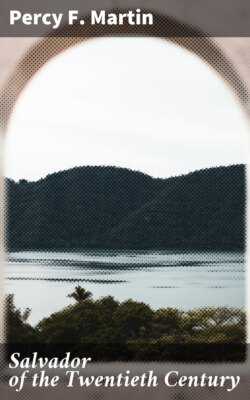Читать книгу Salvador of the Twentieth Century - Percy F. Martin - Страница 8
На сайте Литреса книга снята с продажи.
CHAPTER III
ОглавлениеTable of Contents
Biographical—The President, Dr. Manuel E. Araujo—The ex-President, General Fernando Figueroa—The Cabinet—Dr. Francisco Dueñas—Don Rafael Guirola, D.—Dr. Teodosio Corranza—Dr. Manuel Castro, R.—Dr. Cecilio Bustamente—Señor José Maria Peralta Lagos—Dr. José A. Castro, V.—Dr. E. Bracamonte—Dr. Miguel Dueñas—Señor Carlos G. Prieto—Dr. Artúro Ramón Ávila.
Dr. Manuel Enrique Araujo, President of the Republic of Salvador, although a comparatively young man, has long been regarded as one of the most distinguished scholars and politicians of his time. Born at Jucuapa, he came at a very early age to the Capital, in order to study medicine and surgery, and very soon he secured a wide reputation—extending, indeed, beyond the confines of his own country—as a great authority upon special medical and surgical cases. While still quite young, Dr. Manuel Araujo was married to Señorita Maria Peralta, the beautiful and accomplished daughter of a former President of the Republic, Don José Maria Peralta, a man who enjoyed universal respect and affection.
The young politician was always a strong Liberal in politics, but he never permitted party spirit to prejudice him in respect to his public actions, which have, both before and since his occupancy of the Chief Magistracy, been characterized by complete independence of judgment and commendable broad-mindedness. Besides being the selected occupant of the Presidential Chair by practically all political parties alike, Dr. Araujo is regarded as the representative of both the culture and the scientific professionalism of the country. As already mentioned, he is a very distinguished surgeon; he has also invented some very delicate and useful surgical instruments, many of which may be found in the Paris and Continental hospitals. The Chief Executive occupies the position of President of the Salvador Branch of the Spanish-American University. In social as well as in educational circles, Dr. Araujo is highly respected, apart from his exalted position; and to foreigners he is especially persona grata, on account of his broad sympathies and general charm of manner. It will be entirely contrary to general expectations and present appearances if, during his tenancy of the Chief Magistracy, Salvador fails to enjoy a great industrial peace and prosperity, as well as a financial regeneration, such as has long been devised to place this State in the fore-rank of Latin-American countries.
While politics in Salvador, as in so many other countries north and south of the Equator, have come to be regarded as a profession, Dr. Araujo has shown that he has considered them as accessories rather than expedients, and has carried out in principle the axiom that "he serves his party best who serves his country best." Inasmuch as Dr. Araujo occupied the position of Vice-President of the Republic in the Government of General Fernando Figueroa, it may be assumed that he has been in thorough accord with his policy; and now that he himself occupies the same exalted office, no great change in the Government's projects or methods of carrying them into effect will result. That some of the youngest men have proved the greatest statesmen history clearly shows; and the instance maybe cited of our own brilliant countryman, William Pitt, himself a son of the great Earl of Chatham, who made his first speech in the House of Commons when he was but twenty-two years of age, and became Prime Minister at the age of twenty-three. It is the young blood and youthful activity which are helping to mould a successful future for the Salvador of to-day.
By authority of Article 68 of the Constitution, the National Legislative Assembly elected, last May, Señor Carlos Melendez, Dr. Fernando Lopez, and General Juan Amaya, First, Second and Third Designates respectively, to succeed to the Presidency of the Republic in case of a vacancy occurring during the present term.
